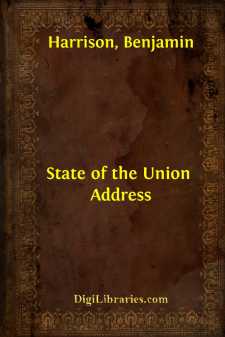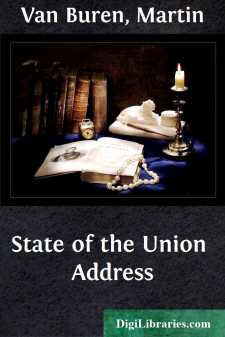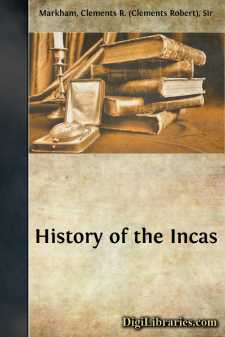History
- Africa 30
- Americas (North Central South West Indies) 50
- Ancient 68
- Asia 58
- Australia & New Zealand 8
- Canada 41
- Caribbean & West Indies 1
- Civilization 20
- Eastern Europe 12
- Europe 310
- Expeditions & Discoveries 60
- General 77
- Historical Geography 1
- Jewish 9
- Latin America 3
- Medieval 8
- Middle East 13
- Military 248
- Revolutionary 8
- Study & Teaching 5
- United States 353
- Western Europe 56
- World 13
History Books
Sort by:
To the Senate and House of Representatives: There are few transactions in the administration of the Government that are even temporarily held in the confidence of those charged with the conduct of the public business. Every step taken is under the observation of an intelligent and watchful people. The state of the Union is known from day to day, and suggestions as to needed legislation find an earlier...
more...
by:
Edward Hayes
INTRODUCTORY NOTE Sir Humphrey Gilbert, the founder of the first English colony in North America, was born about 1539, the son of a Devonshire gentleman, whose widow afterward married the father of Sir Walter Raleigh. He was educated at Eton and Oxford, served under Sir Philip Sidney's father in Ireland, and fought for the Netherlands against Spain. After his return he composed a pamphlet urging...
more...
by:
Martin Van Buren
Fellow-Citizens of the Senate and House of Representatives: We have reason to renew the expression of our devout gratitude to the Giver of All Good for His benign protection. Our country presents on every side the evidences of that continued favor under whose auspices it, has gradually risen from a few feeble and dependent colonies to a prosperous and powerful confederacy. We are blessed with domestic...
more...
"Corruption" in Ancient Rome And Its Counterpart in Modern History Two years ago in Paris, while giving a course of lectures on Augustus at the Collège de France, I happened to say to an illustrious historian, a member of the French Academy, who was complimenting me: "But I have not remade Roman history, as many admirers think. On the contrary, it might be said, in a certain sense, that I...
more...
INTRODUCTION. The publication of the text of the Sarmiento manuscript in the Library of Göttingen University, has enabled the Council to present the members of the Hakluyt Society with the most authentic narrative of events connected with the history of the Incas of Peru. The history of this manuscript, and of the documents which accompanied it, is very interesting. The Viceroy, Don Francisco de...
more...
CHAPTER I THE FIRST CHALDÆAN EMPIRE AND THE HYKSÔS IN EGYPT Syria: the part played by it in the ancient world—Babylon and the first Chaldæan empire—The dominion of the Hyksôs: Âhmosis. Some countries seem destined from their origin to become the battle-fields of the contending nations which environ them. Into such regions, and to their cost, neighbouring peoples come from century to century to...
more...
by:
Richard Hakluyt
CAPVT. 38. De territorio Cathay, et moribus Tartarorum. Totum Imperium Imperatoris Grand Can distinctum est in 12. magnas prouincias, iuxta numerum duodecim filiorum primi Genitoris Can, quarum quælibet in se continet circiter 6. millia ciuitatum, præter villas non numeratas quæ sunt Velut ábsque numero. Habent et singulæ prouinciæ regem principalem, hoc est 12. reges prouinciales, et horum...
more...
by:
John Hunter
Chapter I October 1786 to September 1787 The ships destined for Botany-Bay rendezvous at the Mother-Bank.--Leave that place, and proceed on the voyage.--The convicts on board one of the transports attempt an insurrection.--Are timely discovered, and the ring-leaders punished.--Arrived at Santa Cruz.--Transactions there.--Attempt of a convict to escape.--Description of Laguna, and the adjacent country....
more...
Mr. Speaker, Mr. President, my colleagues in the Congress, our distinguished guests and my fellow Americans: To address a joint session of the Congress in this great Chamber in which I was once privileged to serve is an honor for which I am deeply grateful. The State of the Union Address is traditionally an occasion for a lengthy and detailed account by the President of what he has accomplished in the...
more...
THE FIRST CHAPTER. MULMUCIUS. Matth. West. Polyd. Now to proceede with the aforesaid authors, Mulmucius DunwallÐâ¦ÐÐ, or as other saie Dunuallo Mulmucius, the sonne of Cloton (as testifieth th'english chronicle and also Geffrey of Monmouth) got the vpper hand of the other dukes or rulers: and after his fathers deceasse began his reigne ouer the whole monarchie of Britaine, in the...
more...











